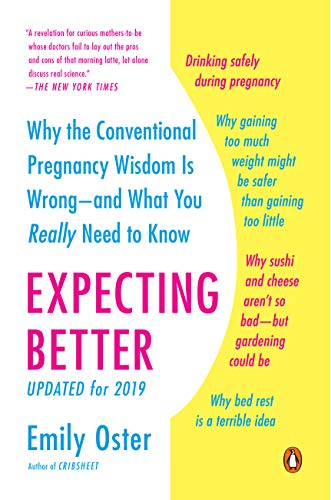

This article is an excerpt from the Shortform summary of "Expecting Better" by Emily Oster. Shortform has the world's best summaries of books you should be reading.
Like this article? Sign up for a free trial here .
Weight gain is a top topic for your prenatal care visits. Gain too much or too little weight, and the child is at risk (and your doctor will probably complain). Even more, the concept of “eating for two” may stimulate pregnant women to overeat.
We’ll cover what the normal weight gain during pregnancy is, and how much exceeds the expected weight gain.
Normal Weight Gain in Pregnancy
Here are the guidelines for suggested weight gain over pregnancy:
| Starting weight | Suggested weight gain (lb) | Weight gain per week (lb) |
| Underweight (BMI < 18.5) | 28-40 | 0.85 |
| Normal Weight (BMI 18.5-25) | 25-35 | 0.75 |
| Overweight (BMI 25-30) | 15-25 | 0.50 |
| Obese (BMI > 30) | 11-20 | 0.38 |
The higher your starting weight, the less weight gain you should have through pregnancy. Conversely, if you are underweight when you get pregnant, you should gain more than average.
Too little or too much weight gain (<22 pounds and >45 pounds, respectively, for a woman starting at normal weight), increases risk of preterm birth by around 1.4x. But both too little and too much weight gain have unique issues.
Risks of Too Little Weight Gain in Pregnancy
Eating too little in pregnancy could cause the fetus to be smaller for gestational age (SGA). Specifically:
- Gaining 10 pounds lower than the recommendation doubles risk of SGA babies (from 10% to 20%) and halves risk of too-large babies (from 5% to 2.5%).
- 42% of SGA babies have complications of difficulty breathing, irregular blood sugar regulation, and abnormal neurological signs
- A SGA baby born prematurely has higher risk of complications than an appropriate weight baby. In one study:
- Chronic lung disease increased from 29% to 57%
- Mortality increased from 17% to 33%
These are serious symptoms and a big caution against too little weight gain during pregnancy.
Risks of Too Much Weight Gain in Pregnancy
Eating too much in pregnancy could cause the fetus to be large for gestational age (LGA):
- Gaining 10 lb more than recommendation doubles risk of LGA babies (from 5% to 10%) and halves risk of SGA babies (from 10% to 5%)
- LGA babies roughly double the risk of requiring C-section and instrument-assisted delivery, and roughly triple risk of needing resuscitation or ICU transfer. (Shortform note: we could not find the baseline rates from Oster’s references)
Another concern is that too much weight gain during pregnancy may cause your child to be overweight later in life. This has been shown in animal studies, with a possible mechanism being insulin resistance in the womb leading to insulin resistance in life.
But this is hard to control from environmental factors and parent habits, and Oster argues the effects are small. One long-term study found that for every kg Mom gained, BMI increased by 0.03. In other words, gaining 10 pounds over the recommendation would increase the child’s future BMI by 0.13 – in the range of 1-2 pounds.
In general, the risks of too little weight gain are more severe than those of too much weight gain.
Returning to Normal Weight after Pregnancy
Some women may undereat in the hopes that they won’t have to take off weight after pregnancy.
One study found that women who gained the recommended amount ended up 5 lbs heavier 6 months after delivery. But 90% of women starting out at normal weight had returned to normal weight by 24 months postpartum.
Given that the risks of SGA babies are far worse, Oster argues that it’s far better to err on gaining too much weight than too little. And gaining 1 pound over the guideline (36 instead of 35 pounds) is not a big deal. While doctors currently get equally concerned over both too little and too much weight gain, Oster argues doctors should weigh too little weight gain much more strongly.
———End of Preview———

Like what you just read? Read the rest of the world's best summary of "Expecting Better" at Shortform . Learn the book's critical concepts in 20 minutes or less .
Here's what you'll find in our full Expecting Better summary :
- Why much parenting advice you hear is confusing or nonsense
- The most reliable way to conceive successfully
- How much alcohol research shows you can drink safely while pregnant (it's more than zero)
- The best foods to eat, and what foods you really should avoid






